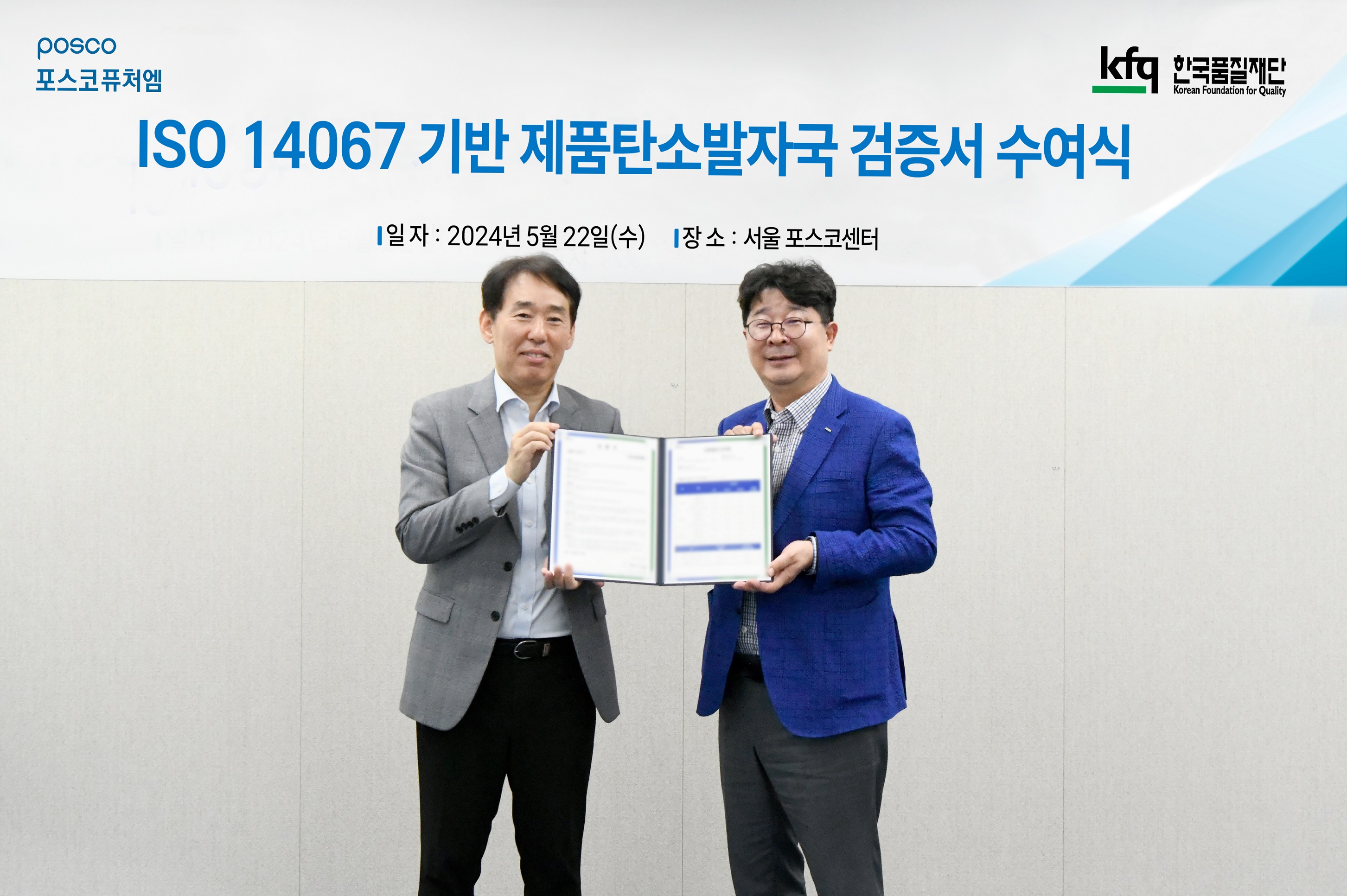- Home
- NEWSROOM
-
 (Photo Description) At the ‘ISO 14067’ verification ceremony held at the POSCO Center in Gangnam, Seoul on the 22nd, Eom Ki-chun, Head of the Energy Materials Business Division at POSCO Future M (right in the photo), and Song Ji-young, CEO of the Korea Foundation for Quality, pose for a commemorative photo.
(Photo Description) At the ‘ISO 14067’ verification ceremony held at the POSCO Center in Gangnam, Seoul on the 22nd, Eom Ki-chun, Head of the Energy Materials Business Division at POSCO Future M (right in the photo), and Song Ji-young, CEO of the Korea Foundation for Quality, pose for a commemorative photo.
- Comprehensive carbon emissions assessment across product lifecycle, from raw material extraction to transportation and production
- Enhanced credibility with global battery and automotive companies amidst mandatory carbon footprint reporting trends
- Utilization in process analysis and energy-saving technology adoption to reduce carbon emissions
POSCO Future M received international standard carbon footprint verification for its anode and cathode materials.
On the 22nd, at the POSCO Center in Gangnam, Seoul, POSCO Future M was awarded the ‘ISO 14067’ carbon footprint verification for its PN6 and PN8 cathode materials and natural graphite anode materials by the Korea Foundation for Quality, an accredited verification body.
*PN6/PN8: Cathode products manufactured by POSCO Future M containing over 60% and 80% nickel content, respectively.
The carbon footprint refers to the total carbon emissions produced throughout a product's lifecycle, including raw material extraction, transportation, and production. ‘ISO 14067’ is an international standard established by the International Organization for Standardization (ISO) in 2018 for the objective measurement of carbon footprints. The Korea Foundation for Quality evaluates companies' adherence to ISO 14067 during their carbon emissions measurement processes and issues verification certificates.
Since its first proposal by the UK Parliament's Science and Technology Committee in 2006, the carbon footprint has been used as an indicator for establishing sustainable consumption and production systems. Notably, under the European Union's battery regulations implemented in February this year, the measurement and reporting of battery product carbon footprints will become mandatory starting in 2025. Non-compliance with these regulations will effectively hinder market operations in the global market.
Amid expanding business collaborations through large-scale supply contracts and establishing overseas joint ventures with global battery and automotive companies, POSCO Future M expects to enhance stakeholder trust through transparent disclosure of carbon emissions management systems by obtaining carbon footprint verification for its anode and cathode materials. This, in turn, is anticipated to bolster the company's position in the global market.
Using the carbon footprint verification data, POSCO Future M plans to analyze production processes, reduce carbon emissions, and adopt energy-saving technologies. Moreover, the company aims to control the carbon footprint of next-generation products, such as high-nickel single-crystal NCMA and NCA cathode materials.
POSCO Future M is expanding the introduction of solar power generation facilities at its business sites and actively promoting low-carbon fuel transitions and process improvements to enhance energy efficiency. The company aims to achieve carbon neutrality in its battery materials business by 2035.